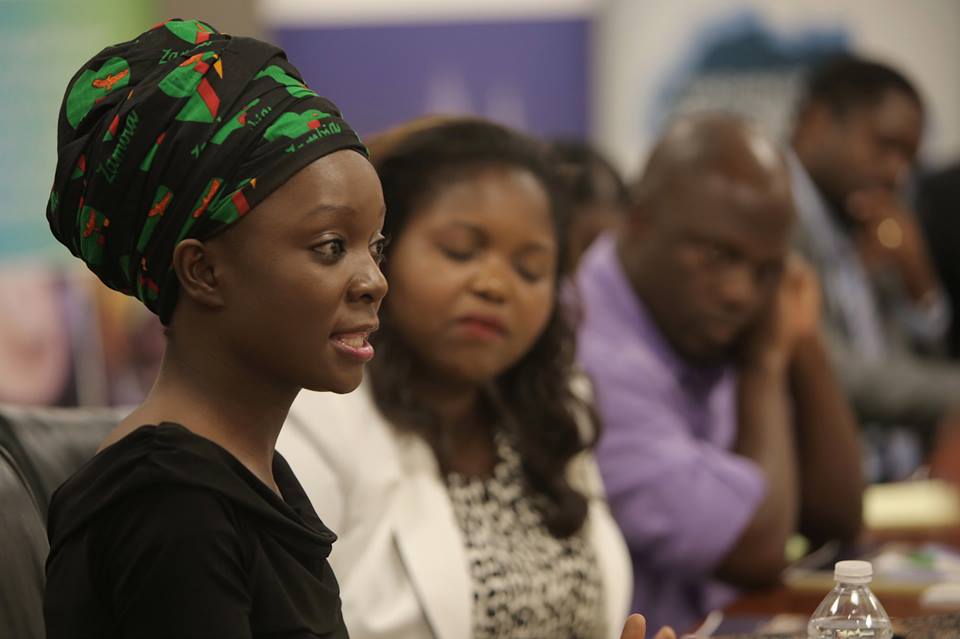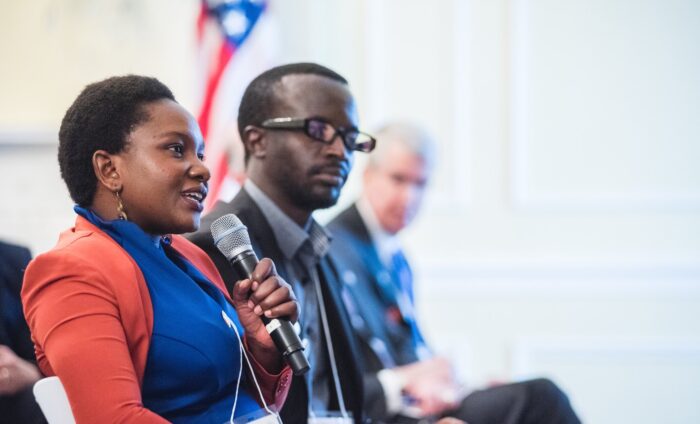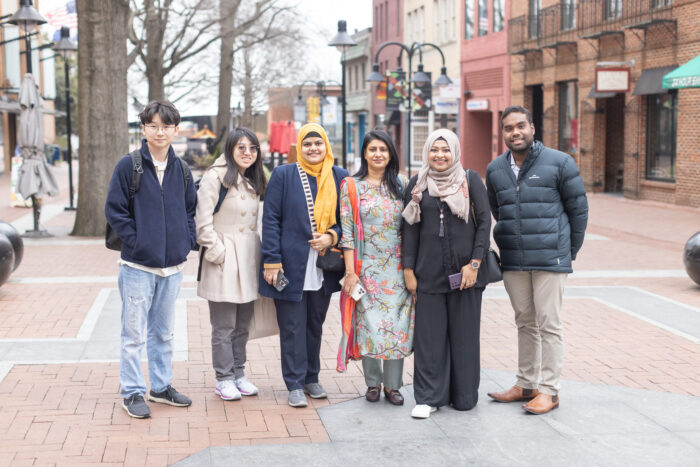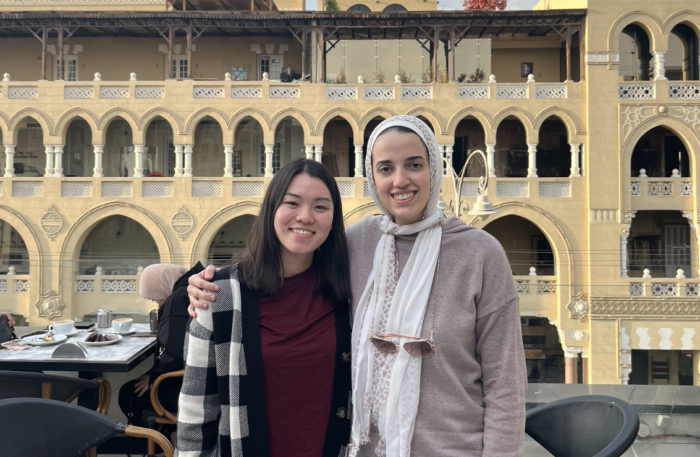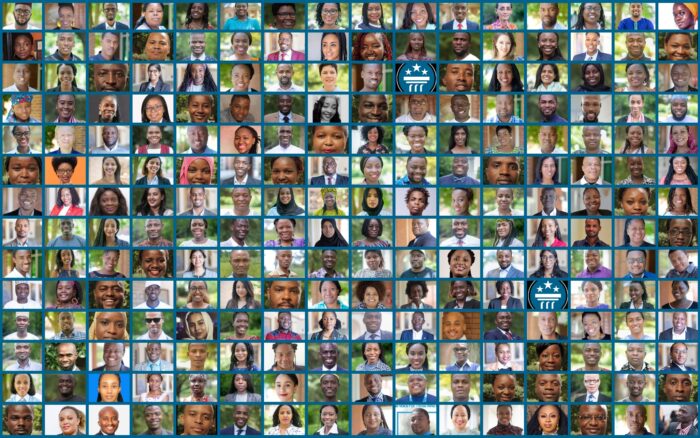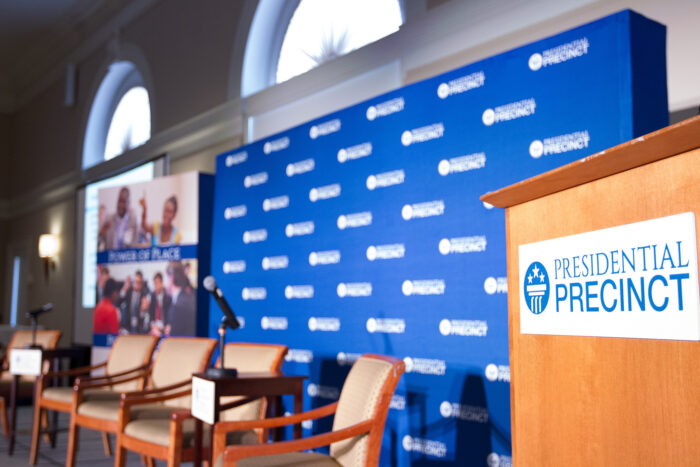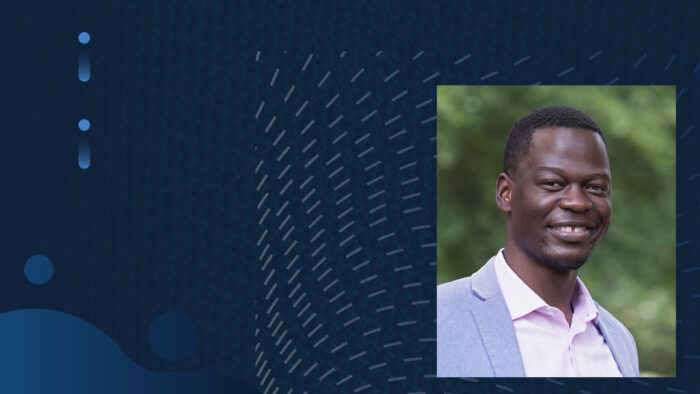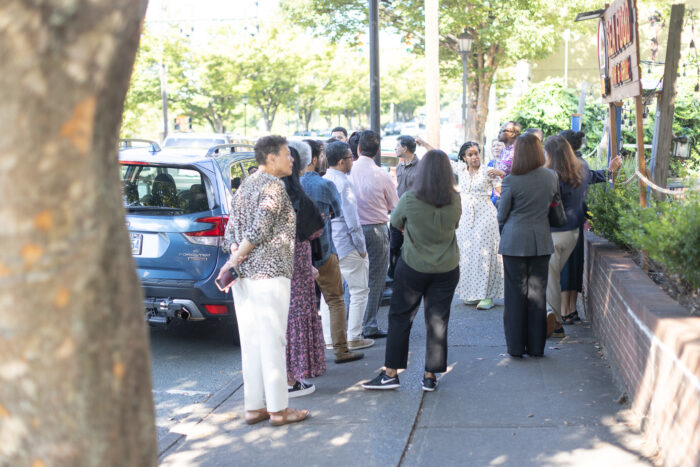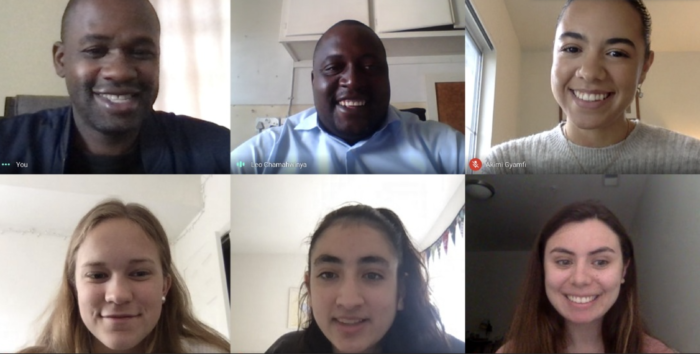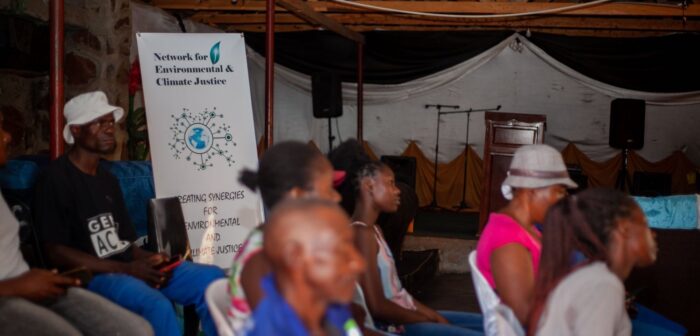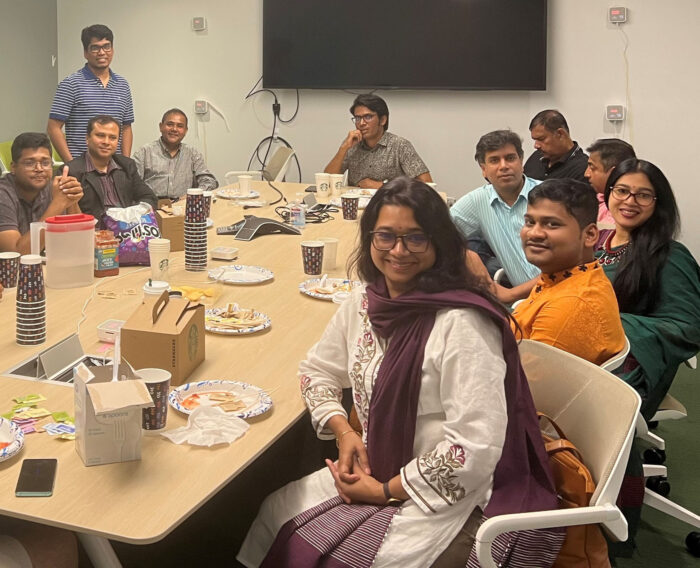Africa's Young Leaders: Recognizing Women's Potential
On July 7, 2014, I had the pleasure of leading a discussion on the evolving roles of women in sub-Saharan Africa with 25 participants in the Young African Leaders Initiative (YALI). YALI is a program launched by President Obama to invest in the next generation of African leaders. In June-August 2014, 500 young African leaders spent six weeks in the United States in training at 20 colleges and universities around the country.
The discussion was held at historic Montpelier, home of James Madison. The Montpelier group was evenly divided between men and women and for many of them, the presence of women in positions of importance in their respective countries is a reality. The group identified gains Africa’s women have made in the past several decades, including increased political power and the emergence of female business leaders and entrepreneurs. They also described challenges that Africa’s women face, such as gender prejudice and restrictive social norms. Finally, they noted measures their governments must take to ensure that progress is sustained — including the provision of adequate financial and other resources and programs to train and educate women for leadership roles.
Changes in women’s roles over the last 20 years
Many women remain mired in poverty and the pathways for girls to political and economic positions of influence are often impeded by cultural and social biases. Overcoming these obstacles will require fundamental changes in attitudes in what are often conservative and traditional societies.
However, circumstances for other African women have improved dramatically. Evolving social norms around the world – increasingly transmitted by the Internet – have affected women everywhere, including in Africa. The promotion of democracy has often run parallel to, and provided a platform for, the promotion of women’s rights. And as women rise to prominence they become role models for the young women in their countries.
Decades of external donor funding for women’s programs in Africa – whether from foreign countries or international organizations – has had an impact in both the political and economic arenas. For example, micro-finance programs that have successfully jump-started small businesses across the continent have largely targeted women.
Gender is a key component of the United Nations’ social agenda and its Millennium Development Goals include commitments to gender equality and the empowerment of women. A July 2014, report summarizing progress toward the Millennium Development Goals in sub-Saharan Africa stated:
Women in the region are gaining more influence in politics. The proportion of seats held by women in single or lower houses of national parliaments increased from 13 per cent in 2000 to 23 per cent in 2014, the second highest among all developing regions. Women’s access to paid jobs in non-agricultural sectors rose from 23 per cent in 1990 to 33 per cent in 2012.
The African Union has pursued its own policies to advance the rights of women and girls – in fact, the African Union Commission is currently chaired by a woman. The 2003 Protocol on the Rights of Women that is intended to combat discrimination and violence against women has been ratified by 36 of 48 signatories. The African Union established the African Women’s Decade (2010-2020) to advance gender equality across a broad range of areas. And in 2006 the African Union’s African Youth Charter included a provision to ensure the equal participation of girls and young women in all aspects of national life, as well as protection against various forms of sexual violence and exploitation.
Women in politics
The YALI participants focused on the significant role of governments in promoting gender equality. Several noted that their countries were incorporating gender into policies affecting national life. Others said that their countries’ constitutions did, or soon would, include provisions mandating that women make up 30% of parliamentary and appointed government positions – consistent with the United Nations Millennium Development Goals. In addition, they pointed to the presence of senior women in their governments – including as ministers, central bankers and more. YALI participants also noted that women are making gains through the bottom-up efforts of civil society. Mandatory gender quotas in the leadership of national youth groups and the work of women’s advocacy organizations were cited as having contributed to progress in this area.
The Montpelier discussion took place against the backdrop of the increasing presence of African women in their countries’ political sector. The numbers of women in senior political positions have climbed steadily in the last 20 years: today Africa has a sitting female president (Liberia), an interim president (Central African Republic) and a recent former president (Malawi).
National government policies have moved women into legislatures across Africa. A majority of sub-Saharan African countries have established electoral quota systems (generally temporary) to ensure that a certain percentage of women occupy seats in national legislatures. The Inter-Parliamentary Union reports that Rwanda has the world’s highest ratio of women in its legislature at 64 percent. The Seychelles, Senegal and South Africa also are ranked in the top 10 countries as a percentage of women in national legislatures.
Indeed, gender policies — implemented through constitutional provisions, creation of special ministries and departments, political party mandates and executive appointments — are being used in sub-Saharan Africa to promote gender equality in many aspects of public life. There has been a continent-wide increase in the number of female ministers (including in positions typically held by men such as Defense, Foreign Affairs and Finance), judges and ambassadors. And African women have achieved positions of power internationally – three African women currently are judges at the International Criminal Court in the Hague.
In addition to pressure from international bodies, donors and national governments, civil society has provided an impetus for change. African women’s groups have lobbied for legal reforms to end discrimination, to provide government funding for women’s issues, to guarantee a percentage of women in political positions, to create institutions to address gender issues and to reform or eliminate customs and traditions that hamper or harm women and girls (such as female genital mutilation). A pan-African coalition of several dozen women’s groups has pressed their respective governments to ratify the African Union’s 2003 Protocol to the African Charter on Human and Peoples’ Rights on the Rights of Women in Africa.
Despite progress, political reform is not always deep
The YALI participants outlined important constraints that exist despite gains made on women’s issues. Societal changes in women’s status in Africa – while significant – are not yet deeply entrenched. Policies mandating equality for women may be enshrined in constitutions, but are not always implemented – whether through lack of political will or a failure to allocate necessary resources. Finally, women may have opportunities for management and leadership positions that they are not trained or educated to fill; several particpants noted the risk that untrained women would become mere figureheads and not role models for other women and girls.
While gender policies may provide women the opportunity to hold senior positions at the national level, officeholders at subnational and local levels remain largely male. This may reflect more conservative views at local levels. And because women generally do not have access to bank credit or other funds available to their male counterparts, they often are less able to mount effective political campaigns than men.
In many African countries, girls’ education is impeded by cultural biases, religious constraints and economic rationales (e.g., why educate a girl who will stay at home). To achieve gender equality in the political sphere, an increase in the number of women in higher office must be accompanied by the development of a talent pool of women ready to step into parliamentary and senior government positions. Women in elected bodies and governments must be able to navigate beyond gender-related and children’s issues and must have the training and experience to make decisions for their districts and countries at large. For example, a female minister of defense or parliamentary speaker has responsibilities that go well beyond that of the women she represents.
Women in business – bringing productivity gains
YALI participants observed that while women are making gains in the public sector because of government mandates, women in the private sector still face significant obstacles.
Nonetheless, both customary and legal barriers to women in business are falling. African women are increasingly educated and increasingly likely to participate in the economic life of their respective countries – whether in the formal or informal economies. Countries where women have equal access to jobs and financial resources are more likely to enjoy higher economic growth. The 2012 World Bank Gender Equality and Development Report says:
gender equality … can enhance economic efficiency and improve other development outcomes … removing barriers that prevent women from having the same access as men to education, economic opportunities and productive inputs can generate broad productivity gains … gender inequality has become more costly for most countries in a world of open trade. Gender inequality diminishes a country’s ability to compete internationally.
While Africa’s women-owned businesses are usually not large by developed country standards, many are succeeding and contributing to their countries’ economies. Gender equality in the private sector can generate productivity gains in a country. And where women are owners of firms involved in the production of goods for trade (such as textiles), an increase in the number of women in business can enhance a country’s participation in global markets.
In addition, new technologies and expanding global markets are having a positive impact on women’s employment opportunities worldwide. According to the 2012 World Bank Gender Equality and Development Report “trade openness and the diffusion of new technologies have translated into more jobs and stronger connections to markets for women, increasing their access to economic opportunities and contributing to their economic empowerment.” As sub-Saharan Africa continues to make rapid advances in the employment of new technologies this trend should continue.
But barriers remain
YALI Participants also pointed to the difficulties that women in business must overcome, highlighting the difficulties of translating public sector reforms to the private sector. One participant suggested that this is because governments are unable to dictate hiring and promotion practices to businesses.
Women in Africa face significant challenges to achieving economic equality with men. They are still more likely than men to work in the informal economy, manage and own smaller companies and work in less-profitable sectors and jobs. And although women control 80% of the continent’s agriculture, their productivity tends to be lower than that of men, often because of an inability to own or control land, a lack of extensive training and few investment resources.
Constraints on achieving economic equality also include family responsibilities, limited access to productive inputs, fewer educational opportunities, and poor or non-existent infrastructure. In particular, access to credit is an impediment to women wanting to start or expand their own businesses. Africa’s businesswomen experience more difficulty than men in getting loans from banks – because of discrimination, because they are less familiar with bank procedures, because they lack the collateral of their male counterparts and because of restrictive customs.
YALI SOLUTIONS
The Montpelier YALI participants were not only accepting of the idea of gender equality in their societies, but cognizant of the need for continued action to promote it. YALI participants identified many solutions to the problems they raised. Most importantly: deepening and sustaining reform; providing the resources needed to allow further reform and development; and providing education and training for women and girls. Following are recommendations based on their comments, my own observations and other sources.
Continue to implement and resource international and national gender equality policies
Governments, international donors and NGOs must continue implementation of national gender policies so that women are represented not only at the national level, but at local levels as well. This might include constitutional provisions guaranteeing women’s equality, targeted recruitment of women for political office, and the ongoing appointment of women not only to government positions concerning the “softer” or social issues, but to the “harder” issues such as defense, finance and foreign affairs. Resource commitments for gender policies should include long-term budget allocations. Gender policies should also be fully implemented and care must be taken to ensure that political positions allocated to women have real power and influence. National governments should work with foreign donors, as well as local NGOs, to ensure that laws and policies are thoroughly implemented.
Provide resources and support for women in business
Governments must provide resources and protections for women starting, running and owning business. This would require eliminating legal or customary discrimination in key areas such as land ownership (as land is an important form of collateral) and the ability to open a business without the consent of a male relative. Training in key business skills must be made available – and in today’s world this must include use of the computer and Internet. And, as lack of access to credit is a chief complaint of African businesswomen, financial institutions must be made to comply with fair lending practices. Finally, African governments should promote their female entrepreneurs as reliable partners for foreign businesses – as women the world over are less likely than men to engage in corruption, repay loans at much higher rates than their male counterparts and more reliably invest profits back into their businesses, their families and their communities.
Educate girls to participate fully in society
There is a growing cadre of educated women in Africa. However, education for girls in the poorest countries, and at the lowest social levels of many countries, remains limited. Girls’ attendance in primary and secondary schools in sub-Saharan Africa has not kept pace with most of the rest of the world. This despite the fact that women who are better educated are better able to care for their children, who themselves tend to complete more education. Educating girls benefits not just the girls themselves, but society at large. Governments must make education for girls a priority. In addition, adult women need preparation for the positions of responsibility that are opening to them. This could include training in media outreach for upcoming politicians, fundraising for political campaigns, using the internet to market their companies, obtaining loans to finance their businesses and more.
CONCLUSION
In the next few years, many of Africa’s authoritarian “Big Men” should be leaving the political stage. With their passing, a new generation of leaders – drawn from sub-Saharan Africa’s growing cadre of middle class, educated, tech savvy young women and men – will be poised to assume positions of leadership. This successor generation has an increasingly global outlook – the result of growing educational opportunities for African students abroad, enhanced access to the Internet and international media and Africa’s progressively greater role in the world economy. They have a better understanding than their elders of democracy, good governance and market economics. These sophisticated young people must be given – or create themselves — opportunities to bring about change.
Africa’s next generation of leaders must overcome a population explosion (the United Nations predicts the number of Africans under 18 will reach one billion by 2050), inter-ethnic and inter-religious conflicts, human rights abuses, poor educational and health care systems, minimal infrastructure, inadequate job creation, skewed income distribution and more. Future leaders must eliminate corruption, move their economies away from dependence on foreign assistance toward full, market-based participation in the global economy and ensure democracy for all of their citizens.
And as these changes take hold, Africa must rebrand itself for the rest of the world – replacing images of desperate poverty and endless conflict with a vision of countries that are sophisticated and dependable members of the international community.
These obstacles cannot be met without continued, sustained and real progress toward the empowerment of women. Mainstreaming women must be an integral part of any reforms. The goal must be not simply to sustain the momentum for women’s empowerment, but also to make it a vehicle for democracy, good governance and greater economic well-being. Promoting, enabling, and empowering women will be essential if the next generation of African leaders is to successfully address the challenges facing the continent.
*The discussion was off the record and participants and their countries are not identified in this article. Many of my observations are drawn from data across the continent.

